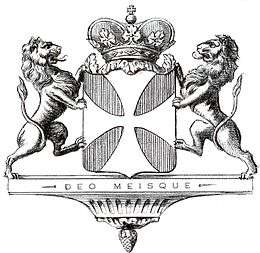Pierre-François, Marquess of Rougé
| Pierre-François, Marquis de Rougé | |
|---|---|
 Coat of Arms of the House of Rougé | |
| Born | 1702 |
| Died |
15 July 1761 (aged 59) Welver, Germany |
| Allegiance |
|
| Rank | Lieutenant General |
| Battles/wars | |
| Other work | Convention of Brandebourg, Signer |
Pierre-François, Marquis de Rougé (1702–1761) was a French nobleman and General. The son of Pierre III, Marquis de Rougé and of Jeanne Prézeau de la Guilletière, he held the hereditary titles Marquis de Rougé, Baron de Coetmen, Lord of Le Tremblay and La Belliere. Later in life he became Governor of Givet and Charlemont. In 1761 he was mortally wounded in battle. He is represented in the palace of Versailles "Museum of the French Glories".
Military career
The Marquis fought in the War of the Polish Succession at the 1733 Siege of Kehl and the 1734 Siege of Philippsburg. He became a colonel in the War of the Austrian Succession. During the Seven Years' War he was taken prisoner and exchanged at the Battle of Rossbach in 1757, and fought against Prussia in Corbach and Kassel.
On 7 September 1759, the Marquis signed a military treaty known later as the "Convention of Brandebourg". This agreement, concluded with the representative of the Prussian armies, General Major Baron Johann Jobst Heinrich von Buddenbrock, stipulated that the hospitals, wounded soldiers and lazarets as well as the medical personnel would not be considered as fighting units. A century later Henry Dunant, founder of the Red Cross, described this as the first "Red Cross treaty" when he requested funds from the Emperor Napoleon III.
The Marquis was fatally wounded at the Battle of Villinghausen, fought on 15 and 16 July 1761. The Marquess of Granby, in a letter, reported that the Marquis de Rougé was talking with his cousin, the Duc de Croy d’Havrée (of the House of Croÿ), his brother-in-law Lieutenant General the Marquis de Verac, and his cousin Lieutenant General Count de Rougé (the Duke de Croy d'Havré's son-in-law) when a cannonball struck the group, killing three of them and taking off the leg of the Marquis de Rougé.
His portrait is in the Galerie des Batailles at Versailles.
Family
On 7 June 1749, he married Jeanne Julie de Coetmen; they had five children:
- Catherine de Rougé (1750–1784)
- Bonabes, Marquis de Rougé (1751–1783)
- Marie de Rougé (1753)
- Olivier de Rougé, Comte de Rougé et du Plessis-Bellière (1756–1816)
- Marie-Avoie de Rougé (1759-1759).[1][2]
They were adopted, at the death of their parents in 1761, by the Princess Innocente Catherine de Rougé du Plessis-Bellière, princess of Lorraine and Duchess of Elbeuf.
References
External links
- "Pierre François de Rougé", French Wikipedia
| French nobility | ||
|---|---|---|
| Preceded by Pierre III de Rougé |
Marquis de Rougé 1707 - 1761 |
Succeeded by Bonabes, Marquess of Rougé |